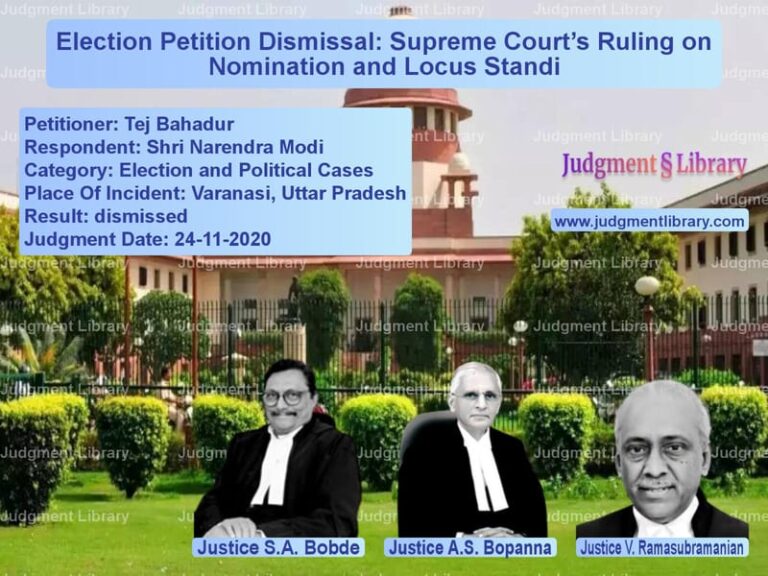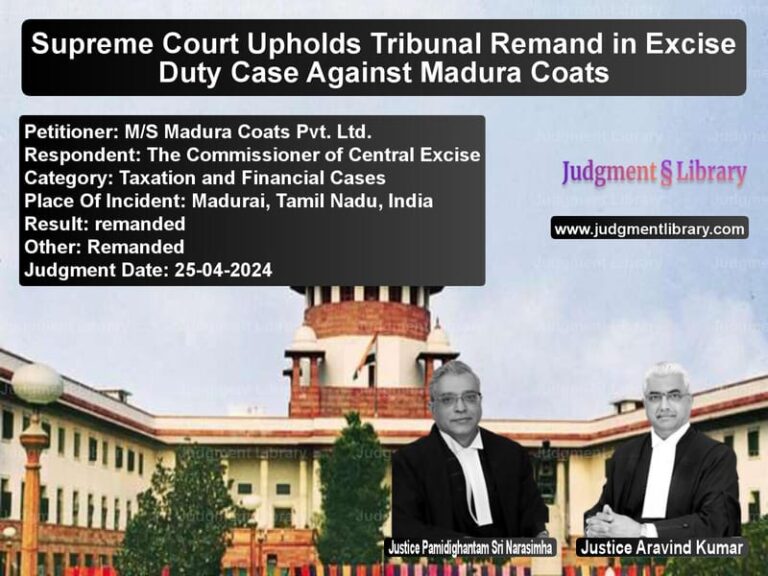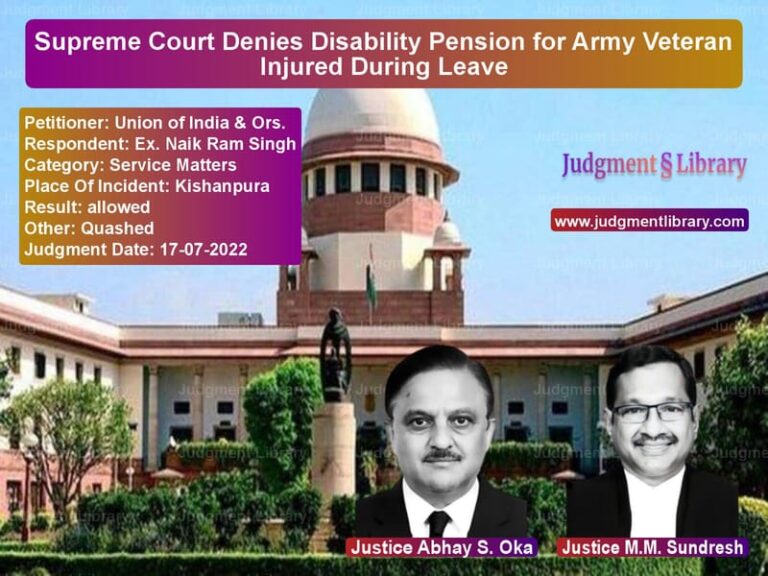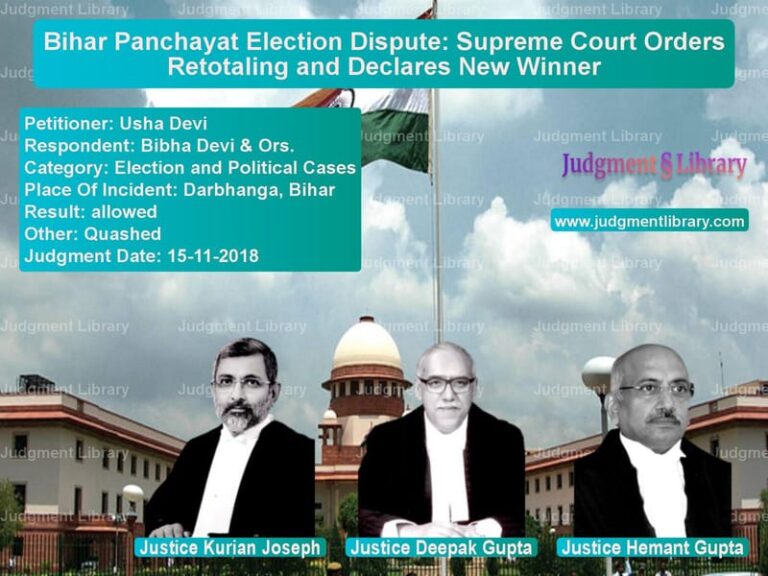Work-Charged Employees Entitled to Pension: Supreme Court Rules in Favor of Service Benefits
The case of Prem Singh v. State of Uttar Pradesh & Ors. revolved around whether the period served by employees in a work-charged establishment should be counted as qualifying service for pension purposes. The Supreme Court examined Rule 3(8) of the Uttar Pradesh Retirement Benefit Rules, 1961, and Regulation 370 of the Civil Services Regulation, which excluded work-charged service from pension eligibility.
The Court ultimately ruled that work-charged employees, after regularization, must be granted the right to have their earlier service counted towards pension calculations. This judgment provides significant relief to thousands of government employees across Uttar Pradesh who have served in similar capacities.
Background and Key Issues
The case was brought to the Supreme Court after several High Court judgments denied pension benefits to work-charged employees, citing Rule 3(8) and Regulation 370. The petitioners, led by Prem Singh, contended that their years of service in work-charged establishments should be included in pension calculations.
The key legal questions before the Supreme Court were:
- Should the period served in a work-charged establishment be counted as qualifying service for pension?
- Does the exclusion of work-charged service violate constitutional rights under Article 14 (Right to Equality)?
- Was the ruling in previous cases like Kesar Chand v. State of Punjab applicable to Uttar Pradesh?
Arguments of the Petitioner (Prem Singh & Others)
The petitioners presented the following arguments:
- The exclusion of work-charged service from pension eligibility was arbitrary and violated Article 14 of the Constitution.
- In several states, including Punjab and Haryana, similar provisions had been struck down.
- Work-charged employees often performed duties identical to those of regular employees but were denied pension benefits.
- Government policies allowed for regularization, but past service was not counted for pension, creating an unfair disadvantage.
Arguments of the Respondents (State of Uttar Pradesh)
The State of Uttar Pradesh opposed the claims on the following grounds:
- Work-charged employees were hired on a temporary basis for specific projects and were not part of the permanent workforce.
- The financial burden on the state would be significant if all work-charged employees were granted pension benefits.
- The rules and regulations had been in place for decades, and altering them would lead to administrative difficulties.
- Work-charged employees were not appointed through regular recruitment processes, and therefore, their service could not be treated on par with regular employees.
Supreme Court’s Key Observations
The Supreme Court analyzed previous rulings, including:
- Kesar Chand v. State of Punjab, where a similar provision was struck down in Punjab.
- Punjab State Electricity Board v. Narata Singh, where the Court held that work-charged service should be counted for pension.
- Habib Khan v. State of Uttarakhand, where similar rules in Uttarakhand were found unconstitutional.
The Court made the following crucial observations:
“The appointment of the work-charged employee in question had been made on a monthly salary, and they were required to cross the efficiency bar also. How their services are qualitatively different from regular employees? No material indicating qualitative difference has been pointed out except making bald statements.”
“It would be highly discriminatory and irrational, because of the rider contained in Note to Rule 3(8) of 1961 Rules, not to count such service particularly when it can be counted in cases where service is sandwiched between two temporary or regular appointments.”
1. Violation of Article 14
The Court held that excluding work-charged service from pension eligibility created an unreasonable classification. Since these employees performed duties similar to regular employees, there was no rational basis to deny them pension benefits.
2. Financial Implications Cannot Override Constitutional Rights
The Court dismissed the argument that granting pension to work-charged employees would lead to financial distress for the state, stating:
“The financial burden cannot be a valid reason to deny legitimate claims of employees who have given decades of service.”
3. Past Rulings in Other States
The Court pointed out that similar provisions had been struck down in Punjab and Uttarakhand, and there was no reason why the same principle should not apply to Uttar Pradesh.
Final Judgment
The Supreme Court set aside the judgments of the lower courts and ruled:
- Rule 3(8) of the Uttar Pradesh Retirement Benefit Rules, 1961, must be read down to include work-charged service as qualifying service for pension.
- Regulation 370 of the Civil Services Regulation is struck down.
- The exclusion of work-charged service is unconstitutional and discriminatory.
- The affected employees must be granted pension benefits, with arrears limited to three years prior to the order.
Impact of the Judgment
The Supreme Court’s ruling has several far-reaching implications:
- Legal Precedent: This judgment sets a precedent for all work-charged employees across India, ensuring their service is counted for pension benefits.
- Relief for Thousands: Many employees who had worked for decades without pension security will now receive their rightful dues.
- Policy Changes: The government may need to amend existing policies to comply with the ruling.
- Strengthening Employee Rights: The judgment reinforces that employment rules must be fair and equitable.
This decision ensures justice for thousands of government employees and upholds the constitutional principles of fairness and equality.
Petitioner Name: Prem Singh.Respondent Name: State of Uttar Pradesh & Ors..Judgment By: Justice Arun Mishra, Justice S. Abdul Nazeer, Justice M.R. Shah.Place Of Incident: Uttar Pradesh.Judgment Date: 02-09-2019.
Don’t miss out on the full details! Download the complete judgment in PDF format below and gain valuable insights instantly!
Download Judgment: Prem Singh vs State of Uttar Prade Supreme Court of India Judgment Dated 02-09-2019.pdf
Direct Downlaod Judgment: Direct downlaod this Judgment
See all petitions in Pension and Gratuity
See all petitions in Public Sector Employees
See all petitions in Judgment by Arun Mishra
See all petitions in Judgment by S. Abdul Nazeer
See all petitions in Judgment by Mukeshkumar Rasikbhai Shah
See all petitions in allowed
See all petitions in Modified
See all petitions in supreme court of India judgments September 2019
See all petitions in 2019 judgments
See all posts in Service Matters Category
See all allowed petitions in Service Matters Category
See all Dismissed petitions in Service Matters Category
See all partially allowed petitions in Service Matters Category







